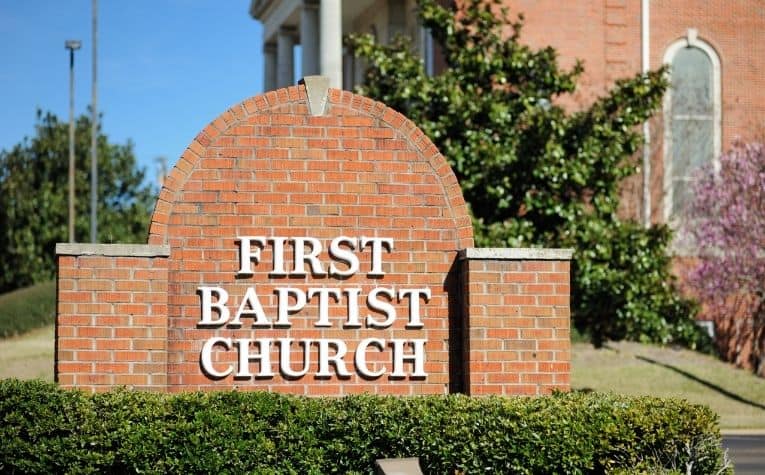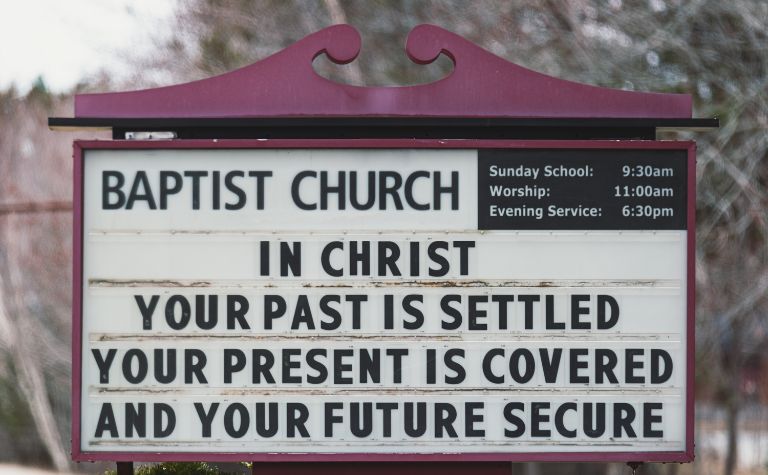Predestination is an important theological topic to many Christians because it informs their understanding of God’s sovereignty, people’s salvation, and the Church’s mission in the world. What exactly is the extent of God’s involvement in determining the eternal destiny of individuals?
In the Baptist tradition, there are denominations, churches, and individuals that rigorously defended the doctrine of predestination and others that opposed it with the same intensity. Those who believe in predestination are historically called “Particular Baptists,” and those who oppose it, are “General Baptists.”
What Baptist denominations believe in predestination, and which ones are opposed to it? Are there any that welcome both perspectives? What about the largest Baptist denomination, the Southern Baptist Convention? What position does it defend? Keep reading to learn more.

Which Baptist Denominations Believe In Predestination?
The doctrines that have historically defined the Baptist tradition, in addition to the central tenets of Protestant Christianity, include “believer’s baptism,” which holds that only professing Christians (and therefore not infants) should be baptized, the autonomy of the local church, and the separation of church and state. (Also see What Does First Baptist Mean?)
What has marked the Baptist movement are matters that concern ecclesiology, i.e., the doctrine of the Church, and not so much soteriology, i.e., the doctrine of salvation.
As long as members agreed to the matters of ecclesiology, Baptist churches welcome differences of opinion on soteriology. (Also see Do Baptists Believe in Original Sin?)
Examples of Baptist denominations that welcome different views on predestination
Many of the largest Baptist denominations are open to members who believe in predestination as it relates to salvation, as well as those who are opposed to it. Baptist denominations that fit this description include:
- The Southern Baptist Convention (the SBC is the largest Baptist denomination and the largest Protestant denomination in America)
- The Conservative Baptist Association of America
- Converge Worldwide (formerly the Baptist General Conference
- American Baptist Churches of America
Reformed Baptist: Particular Baptists, or Reformed or Calvinist Baptists, have always played an important role in the Baptist tradition.
Reformed Baptists from previous centuries, like Charles Spurgeon and A.W. Pink, continue to influence modern-day Baptists, as do modern pastors and theologians like John Piper. (Also see What’s the Difference Between First Baptist and Second Baptist?)
Examples of Reformed Baptist denominations:
- Association of Reformed Baptist Churches of America
- Primitive Baptists
Non-Reformed Baptist: General Baptists, or Arminian Baptists, have also played an important role in the Baptist tradition. The founders of the first Baptist church in 17th century Europe, John Smyth, and Thomas Helwys, were Arminian.
Roger Williams, who established the first Baptist church in America in Rhode Island in 1639, may have also been Arminian.
Examples of Arminian Baptist denominations:
- General Association of General Baptists
- National Association of Free Will Baptists

Calvinist and Arminian Baptist Confessions
Various Baptist groups have articulated “confessions,” which are essentially a statement of beliefs, since the movement’s inception in the 17th century.
Some Baptist confessions have expressed beliefs in predestination according to the Reformed or Calvinist understanding of the term. Other confessions have articulated an Arminian understanding of the term.
| Example of a Particular Baptist Confession |
|---|
| The London Confession of 1689 |
| “Those whom God hath predestinated unto life, he is pleased in his appointed, and accepted time, effectually to call, by his Word and Spirit, out of that state of sin and death in which they are by nature, to grace and salvation by Jesus Christ; enlightening their minds spiritually and savingly to understand the things of God.” (emphasis added) |
| Example of a General Baptist Confession |
|---|
| Treatise of the Faith and Practices of the Free Will Baptists of 1935 |
| “The call of the Gospel is co-extensive with the atonement to all men, both by the word and strivings of the Spirit, so that salvation is rendered equally possible to all; and if any fail of eternal life, the fault is wholly his own.” |
Baptists Understand Predestination Differently
In one sense, all Baptist denominations “believe in predestination” because it is a term found in all English Bibles (e.g., Rom. 8:29, Eph. 1:5). Therefore, it’s not a matter of if a denomination believes in predestination, but how they understand the term and it’s implications.
When a person asks if an individual or church “believes in predestination,” their question is often about salvation. They have in mind the idea that God has elected certain people to respond to the gospel, put their faith in Christ, and go to heaven, while not electing others. (Also see Do Baptists Believe Jesus Is God?)
What would the alternative interpretation be if the Bible uses the term “predestination”? Non-Reformed or Arminian interpretations of passages that include the idea of predestination often explain the term in relation to what God predestines believers to do:
- Option #1: The term predestination describes God electing certain people to put their faith in Christ and go to heaven when they die while not choosing others. This position defines predestination in relation to salvation.
- Option #2: The term predestination describes God’s will for believers, e.g., God has predetermined that all believers become like Christ. This position defines predestination in relation to sanctification.

Baptists Who Affirm Predestination
Baptists who affirm a Reformed or Calvinist understanding of salvation often use the verses below to support the doctrine. (Also see Do Baptists Believe Baptism is Necessary for Salvation?)
- Acts 13:48, “And when the Gentiles heard this, they began rejoicing and glorifying the word of the Lord, and as many as were appointed to eternal life believed.” (ESV, emphasis added)
- Romans 8:29-30, “For those whom He foreknew, He also predestined to become conformed to the image of His Son, so that He would be the firstborn among many brethren; 30 and these whom He predestined, He also called; and these whom He called, He also justified; and these whom He justified, He also glorified.” (ESV, emphasis added)
- Ephesians 1:5, “He predestined us to adoption as sons through Jesus Christ to Himself, according to the kind intention of His will” (ESV, emphasis added)
- 2 Thess 2:13, “But we ought always to give thanks to God for you, brothers beloved by the Lord, because God chose you as the firstfruits to be saved, through sanctification by the Spirit and belief in the truth.” (ESV, emphasis added)
Baptists Who Deny Predestination
Baptists who deny the Reformed understanding of predestination have a different perspective on the verses above. Many of their explanations revolve around believers (not unbelievers) being predestined for certain virtues (i.e., Christ-likeness) or certain tasks (e.g., preaching the gospel).
A critical verse to this perspective is 1 Timothy 2:3-4, “This is good, and it is pleasing in the sight of God our Savior, who desires all people to be saved and to come to the knowledge of the truth.” (ESV)
Calvinism and Arminianism Are Important to Baptist History
Devout Baptist Charles Spurgeon, a committed Calvinist, once said: “When a Calvinist says that all things happen according to the predestination of God, he speaks the truth, and I am willing to be called a Calvinist.”
He continues, “But when an Arminian says that when a man sins, the sin is his own and that if he continues in sin and perishes, his eternal damnation will lie entirely at his own door, I believe that he speaks the truth, though I am not willing to be called an Arminian. The fact is, there is some truth in both these systems of theology.”
References:
[1] Source
[2] Source
[3] Source
Related Questions
The Baptist tradition, like other branches of the Christian faith, has a variety of expressions. The different names of denominations and churches within the tradition reflect this. Understanding...
Baptist denominations and churches, which date to the 17th century, comprise one of the largest branches of Christianity in the Western world. While Christian churches in Baptist networks and...
